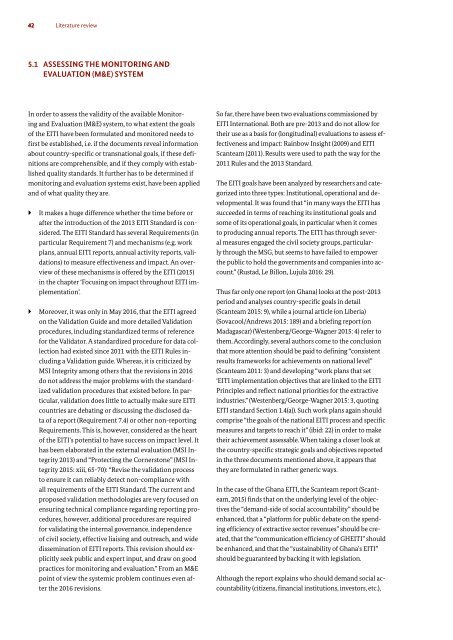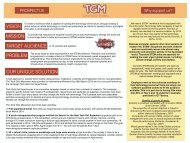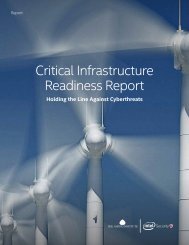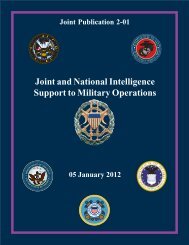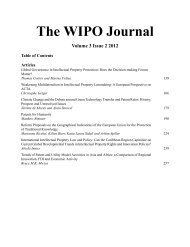Transparency Initiative (EITI)
2eoch1l
2eoch1l
Create successful ePaper yourself
Turn your PDF publications into a flip-book with our unique Google optimized e-Paper software.
42 Literature review<br />
5.1 ASSESSING THE MONITORING AND<br />
EVALUATION (M&E) SYSTEM<br />
In order to assess the validity of the available Monitoring<br />
and Evaluation (M&E) system, to what extent the goals<br />
of the <strong>EITI</strong> have been formulated and monitored needs to<br />
first be established, i.e. if the documents reveal information<br />
about country-specific or transnational goals, if these definitions<br />
are comprehensible, and if they comply with established<br />
quality standards. It further has to be determined if<br />
monitoring and evaluation systems exist, have been applied<br />
and of what quality they are.<br />
``<br />
``<br />
It makes a huge difference whether the time before or<br />
after the introduction of the 2013 <strong>EITI</strong> Standard is considered.<br />
The <strong>EITI</strong> Standard has several Requirements (in<br />
particular Requirement 7) and mechanisms (e.g. work<br />
plans, annual <strong>EITI</strong> reports, annual activity reports, validations)<br />
to measure effectiveness and impact. An overview<br />
of these mechanisms is offered by the <strong>EITI</strong> (2015)<br />
in the chapter ‘Focusing on impact throughout <strong>EITI</strong> implementation’.<br />
Moreover, it was only in May 2016, that the <strong>EITI</strong> agreed<br />
on the Validation Guide and more detailed Validation<br />
procedures, including standardized terms of reference<br />
for the Validator. A standardized procedure for data collection<br />
had existed since 2011 with the <strong>EITI</strong> Rules including<br />
a Validation guide. Whereas, it is criticized by<br />
MSI Integrity among others that the revisions in 2016<br />
do not address the major problems with the standardized<br />
validation procedures that existed before. In particular,<br />
validation does little to actually make sure <strong>EITI</strong><br />
countries are debating or discussing the disclosed data<br />
of a report (Requirement 7.4) or other non-reporting<br />
Requirements. This is, however, considered as the heart<br />
of the <strong>EITI</strong>’s potential to have success on impact level. It<br />
has been elaborated in the external evaluation (MSI Integrity<br />
2013) and “Protecting the Cornerstone” (MSI Integrity<br />
2015: xiii, 65-70): “Revise the validation process<br />
to ensure it can reliably detect non-compliance with<br />
all requirements of the <strong>EITI</strong> Standard. The current and<br />
proposed validation methodologies are very focused on<br />
ensuring technical compliance regarding reporting procedures,<br />
however, additional procedures are required<br />
for validating the internal governance, independence<br />
of civil society, effective liaising and outreach, and wide<br />
dissemination of <strong>EITI</strong> reports. This revision should explicitly<br />
seek public and expert input, and draw on good<br />
practices for monitoring and evaluation.” From an M&E<br />
point of view the systemic problem continues even after<br />
the 2016 revisions.<br />
So far, there have been two evaluations commissioned by<br />
<strong>EITI</strong> International. Both are pre-2013 and do not allow for<br />
their use as a basis for (longitudinal) evaluations to assess effectiveness<br />
and impact: Rainbow Insight (2009) and <strong>EITI</strong><br />
Scanteam (2011). Results were used to path the way for the<br />
2011 Rules and the 2013 Standard.<br />
The <strong>EITI</strong> goals have been analyzed by researchers and categorized<br />
into three types: Institutional, operational and developmental.<br />
It was found that “in many ways the <strong>EITI</strong> has<br />
succeeded in terms of reaching its institutional goals and<br />
some of its operational goals, in particular when it comes<br />
to producing annual reports. The <strong>EITI</strong> has through several<br />
measures engaged the civil society groups, particularly<br />
through the MSG, but seems to have failed to empower<br />
the public to hold the governments and companies into account.”<br />
(Rustad, Le Billon, Lujula 2016: 29).<br />
Thus far only one report (on Ghana) looks at the post-2013<br />
period and analyses country-specific goals in detail<br />
(Scanteam 2015: 9), while a journal article (on Liberia)<br />
(Sovacool/Andrews 2015: 189) and a briefing report (on<br />
Madagascar) (Westenberg/George-Wagner 2015: 4) refer to<br />
them. Accordingly, several authors come to the conclusion<br />
that more attention should be paid to defining “consistent<br />
results frameworks for achievements on national level”<br />
(Scanteam 2011: 3) and developing “work plans that set<br />
‘<strong>EITI</strong> implementation objectives that are linked to the <strong>EITI</strong><br />
Principles and reflect national priorities for the extractive<br />
industries.” (Westenberg/George-Wagner 2015: 3, quoting<br />
<strong>EITI</strong> standard Section 1.4(a)). Such work plans again should<br />
comprise “the goals of the national <strong>EITI</strong> process and specific<br />
measures and targets to reach it” (ibid: 22) in order to make<br />
their achievement assessable. When taking a closer look at<br />
the country-specific strategic goals and objectives reported<br />
in the three documents mentioned above, it appears that<br />
they are formulated in rather generic ways.<br />
In the case of the Ghana <strong>EITI</strong>, the Scanteam report (Scanteam,<br />
2015) finds that on the underlying level of the objectives<br />
the “demand-side of social accountability” should be<br />
enhanced, that a “platform for public debate on the spending<br />
efficiency of extractive sector revenues” should be created,<br />
that the “communication efficiency of GH<strong>EITI</strong>” should<br />
be enhanced, and that the “sustainability of Ghana's <strong>EITI</strong>”<br />
should be guaranteed by backing it with legislation.<br />
Although the report explains who should demand social accountability<br />
(citizens, financial institutions, investors, etc.),


